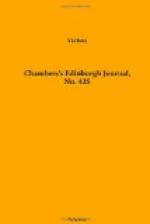A pleasant philosophy this; but we happen to know that sailors do not take cheerily to ’a life of wo’—they would be more than men if they did. He talks coolly about times at sea when ’no duty calls the gallant tars.’ We should very much like to know on board what ’old barkey,’ and in what latitude and longitude, this phenomenon happened, and would have no particular objection to sign articles for a voyage in such a Ph[oe]nix of a ship; for in all the vessels we ever were acquainted with, there was never such a thing heard of, as ’nothing to do.’ As to ‘Saturday nights’ exclusively devoted to pledging ‘sweethearts and wives’ over a flowing can in the forecastle, we are sorry to say, we regard that as little better than a poetic myth.
Doubtless, at the time Dibdin’s songs were written, sailors sang them to a considerable extent, for the public enthusiasm would in a way compel Jack to acquiesce in these eulogies on himself; but the said Jack never took them fairly to heart—how could he, when every voyage he made must have given the lie to many of these glowing pictures of life at sea? And from that time to the present, Dibdin’s songs have gradually been forgotten among seamen, till, at this day, we question whether there is a foremast—Jack afloat who can sing half-a-dozen of them; and, probably, not many men aboard merchantmen know more than one or two songs of the hundred in question, although they may recollect fragments of several.
Dibdin’s songs might be ‘worth a dozen pressgangs’ for manning the navy in war-time, and, for aught we can predicate to the contrary, they may be so again; but we reiterate our conviction, that they never caused sailors to ship aboard a man-o’-war. Landsmen might volunteer by scores through the influence of such stirring, patriotic ditties; but seamen, who ‘knew the ropes,’ would never be induced to ship through their agency.
Dibdin does ample justice to the bravery, the generosity, the good-humour, the kind-heartedness of sailors; and, as a class, they deserve his encomiums. His songs abound with just and noble sentiments, and manly virtues were never more constantly and strikingly enunciated by any author. We dearly love Charles Dibdin for this; and as a writer of popular lyrics, we class him as the very first England has ever produced. In this department of literature, we consider he holds the same place in England as Burns does in Scotland; Béranger, in France; Freiligrath, in Germany; and Hans Christian Andersen, in Denmark.
The reader will now ask: ‘What songs do sailors sing?’ We answer, that their favourite sea-songs[5] are the most dismal, droning doggrel it is possible to conceive; and yet they relish them mightily, because they are stern matter of fact, and in most instances are descriptive of a battle, a chase, a storm, or a shipwreck—subjects appealing powerfully to their sympathies. The following may be taken as a tolerably fair specimen of the style of the genuine ‘sailors’ songs:’—




